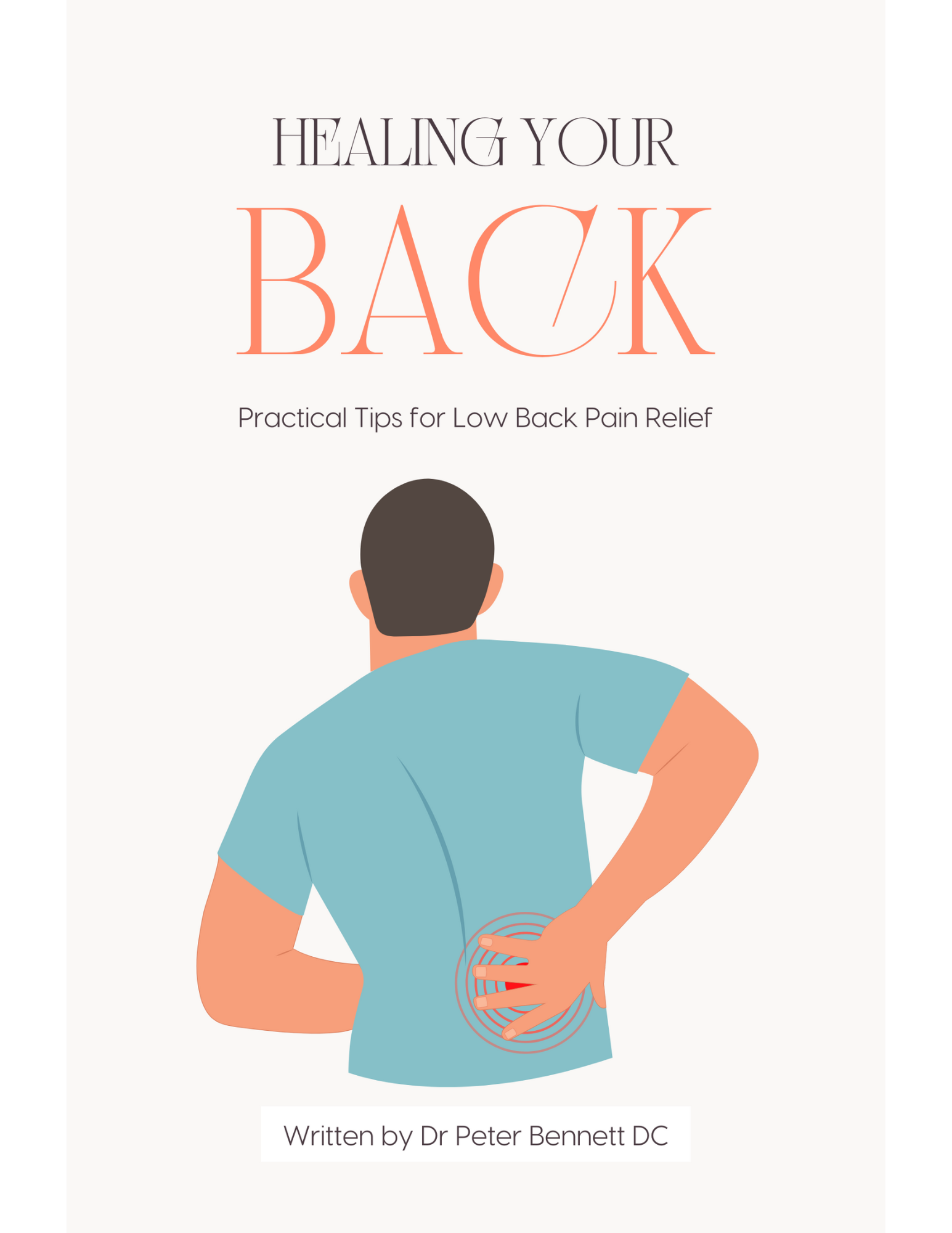5 Poets Walk, Penrith CA11 7HJ
01768 899 036
MONDAY TO THURSDAY: 9:00am - 6:30pm.
Still Living with Back Pain in Cumbria? Start Healing Naturally Today.
If you're over 40 and your back pain hasn’t gone away in 6 months or more, you’re not alone — and it’s not your fault. You can feel better, naturally, with gentle care that supports your spine, your nervous system, and your life.
Over 20 Years Helping Cumbria Move Freely Again
Gentle, Natural Care — No Cracking or Pushing
Proven Help for Back Pain That Won’t Go Away
Download Your Free Copy of Healing Your Back Naturally
Back Pain That Lasts Is a Signal — Not a Life Sentence.
Chronic back pain is incredibly common in people over 40 — especially here in Cumbria, where life can be active, physical, and demanding. Most people have been told to stretch more, take painkillers, or “learn to live with it.” But that’s not real help.
Your body is trying to heal — it just needs the right support. My name’s Peter Bennett, and I’ve helped thousands of people across Cumbria reduce or completely recover from persistent back pain using natural, gentle chiropractic care.
🎁 Get My Amazon-Published Book Healing Your Back Naturally — Free Today
Healing Your Back Naturally
Everything I’ve learned in over 20 years helping people like you… is now yours, free.

Inside this easy-to-read, practical guide, you’ll discover:
Why chronic back pain happens — and why it sticks around
How your spine and nervous system work together to heal
What most people get wrong (and how to break the cycle)
What you can do at home, starting today
But
WHAT IF
“I’ve tried everything.”
✔ You’ve treated symptoms. I help you correct the cause.
“I’m too old.”
✔ Age makes healing slower — not impossible. I help people in their 60s, 70s, even 80s move freely again.
“I don’t want to be cracked.”
✔ No cracking here. My approach is calm, gentle, and effective — even if you’re nervous or sensitive.
Why Gentle Chiropractic Works — Even After Months (or Years) of Pain
Your spine protects your nervous system — and your nervous system controls everything. When spinal movement is restricted or misaligned, it affects how your body heals, how it moves, and how it feels.
By restoring clear communication between your brain and body, gentle chiropractic helps:
Free up stiff joints and trapped nerves
Improve posture and movement
Calm the pain signals that won’t turn off
Support lasting healing — not just quick fixes
Your First Step Could Be the Easiest One Yet.
Download your free copy of Healing Your Back Naturally — and discover what’s really keeping you in pain.
STILL NOT SURE?
Frequently Asked Questions
Why does my back still hurt after all this time?
Because the root cause hasn’t been addressed. The nervous system can stay “stuck” in pain mode — and needs support to reset.
Is it safe for people in their 50s, 60s or 70s?
Absolutely. My approach is gentle, and designed with your age, health and comfort in mind. I've safely looked after clients in theuir 90s
Do you treat people from my town?
I see clients from Carlisle, Penrith, Kendal, Keswick and the whole of Cumbria.
How do I book?
Use the button below to see available appointments online.
Natural Back Pain Relief, Right Here in Cumbria
Whether you’re in town or out in the hills, you shouldn’t have to travel far — or wait months — for real help. I’m proud to serve the people of Cumbria with care that’s local, natural, and trusted.
Carlisle, Penrith, Kendal, Keswick, Eden Valley, Westmorland, South Lakes
Take the First Step — It Could Change Everything
If I can't help you I'll tell you straight away - no messing about

👋 ABOUT PETER BENNETT

Peter Bennett
Hi, I’m Peter Bennett — Chiropractor in Cumbria for Over 20 Years
I specialise in helping people get back to living their lives — without back pain ruling their days. I believe in working with the body, not against it. That means no heavy manipulation, no “cracks,” and no one-size-fits-all treatments.
Just calm, natural help from someone who listens and supports your recovery.
Learn More

GLP-1 Weight Loss Risks: What You Should Know About Back Pain After Weight Loss
The rise of GLP-1 medications like Ozempic, Wegovy, and Mounjaro has changed the game for weight loss. These powerful drugs, originally developed for type 2 diabetes, are now helping people shed significant amounts of weight—often very quickly.
But many people are now asking an important question:
What are the risks of losing weight too fast? And why are some people experiencing back pain after weight loss?
As a chiropractor and spinal health expert, I’ve started to see a pattern: patients who lose a lot of weight with these medications are coming into the clinic with new or worsened back pain, changes in posture, and a sense of core weakness.
So let’s take a closer look at what’s going on—and what you can do to stay strong and pain-free if you're using (or thinking about using) these medications.
What Are GLP-1 Medications?
GLP-1 receptor agonists (like Ozempic, Wegovy, and Mounjaro) work by:
Suppressing appetite
Slowing stomach emptying
Helping the body regulate blood sugar
The result? Many people lose 10–20% of their body weight in just a few months.
That sounds like a win—and for many people, it is.
But the speed and scale of this weight loss can come with hidden consequences if not managed correctly.
GLP-1 Weight Loss Risks: It’s Not Just Fat You’re Losing
One of the lesser-known GLP-1 weight loss risks is muscle loss.
Research shows that up to 40% of the weight lost on these drugs can come from lean body mass—that includes muscle.
Why does that matter?
Because muscle is essential for spinal health. It stabilises your back, supports your posture, and protects you from injury. When you lose muscle, especially in your core and back, your spine can become more vulnerable.
This helps explain why some people experience back pain after weight loss—even though they’re healthier in other ways.
Why You Might Feel Back Pain After Weight Loss
Here are three common reasons people feel new or worsening back pain after losing weight:
1.Loss of Core Strength
Your abdominal and lower back muscles act like a natural corset for your spine. If you lose too much muscle without strengthening exercises, your spine has less support—and you may feel pain when bending, lifting, or even standing for long periods.
2.Postural Changes
When you lose belly fat or weight from your upper body, your centre of gravity changes. This can affect the natural curves of your spine and strain muscles and joints that were used to supporting a heavier frame.
3.Bone Density Concerns
Rapid weight loss—especially without exercise—can lead to bone thinning. This is especially true in the spine and hips, where less mechanical loading (from both body weight and muscle use) can lead to a loss of bone density over time.
The Good News: You Can Prevent These Problems
Here’s the part that too many people miss:
These issues are avoidable—but only if you take an active role in protecting your spine, muscles, and bones while you’re losing weight.
Here’s how:
✅Eat enough protein
Aim for at least 80–120g of protein per day (depending on your size and activity level) to support muscle retention.
✅Do resistance exercises
Simple bodyweight exercises like squats, wall sits, bridges, and planks can make a huge difference. Twice a week is a great start.
✅Stay mobile
Walking, climbing stairs, and using your body throughout the day helps maintain bone density and joint function.
✅Treat GLP-1 meds as a short-term tool
These drugs are not meant to be used forever. Use the momentum they give you to build new habits—not avoid them.
Final Thoughts
GLP-1 medications can be life-changing, but they’re not a shortcut to long-term health. If you're using these drugs, or thinking about it, take steps now to protect your spine, preserve muscle, and stay strong as you lose weight.
That way, you’ll be lighter—but not weaker. Healthier—but not more fragile. And you’ll be able to move freely and confidently in your new body.
If you're experiencing back pain after weight loss, or want guidance on how to support your spine during your weight loss journey, we’re here to help. Book a consultation at Your Spinal Health, and we’ll help you stay strong from the inside out.
Peter Bennett, DC
Chiropractor and Spinal Health Specialist
Your Spinal Health
© 2025 | Privacy Policy
5 Poets Walk, Penrith CA11 7HJ, Cumbria
01768 899 036
Carlisle, Penrith, Kendal, Keswick, Eden Valley, Westmorland, South Lakes
Gentle chiropractic care for chronic back pain in Cumbria


